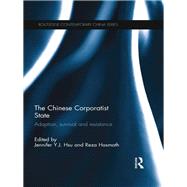- ISBN: 9780415640725 | 0415640725
- Cover: Hardcover
- Copyright: 12/7/2012
The modern Chinese state has traditionally affected every major aspect of the domestic society. With the growing liberalization of the economy, coupled with an increasing complexity of social issues, there is a belief that the state is retreating from an array of social problems from health to the environment. Yet, as we survey China's political landscape today we see not only is the central state playing an active role in managing social problems, but new state actors, at the local level, are increasingly seeking to partner with various nongovernmental organizations or social associations to ensure the continuing presence, legitimacy and viability of the state. In this context, this edited book brings together a series of inter-connected chapters that examine how a corporatist understanding of state-society relations may be reconstituted in light of new social stakeholders emerging to the forefront; and playing a greater role in managing contemporary social issues. The chapters in the collection will explore the following themes: How the current corporatist state manifests itself in the social realm, with special attention to one of the following: NGOs, social organizations, business associations, rade unions, religious associations, and their interactions with the state Assess the relationship between state and social actors. Does the existence of new social actors indicate a shift in power from state to society? Present a systematic understanding of the strategies deployed by social actors to negotiate changes Examine the similarities and differences in the functioning of the local and central corporatist state Discuss the future direction of the corporatist state Viewing Chinese state-society relations with a corporatist lens allows the observer to investigate the opening up of social space while acknowledging the continued control of the state in various realms. Each contribution is based on recent fieldwork in China, thus ensuring the book's quality, innovativeness and uniqueness. This timely collection will appeal to students and scholars of contemporary China, as well as as those concerned with the process of socio-political change.






